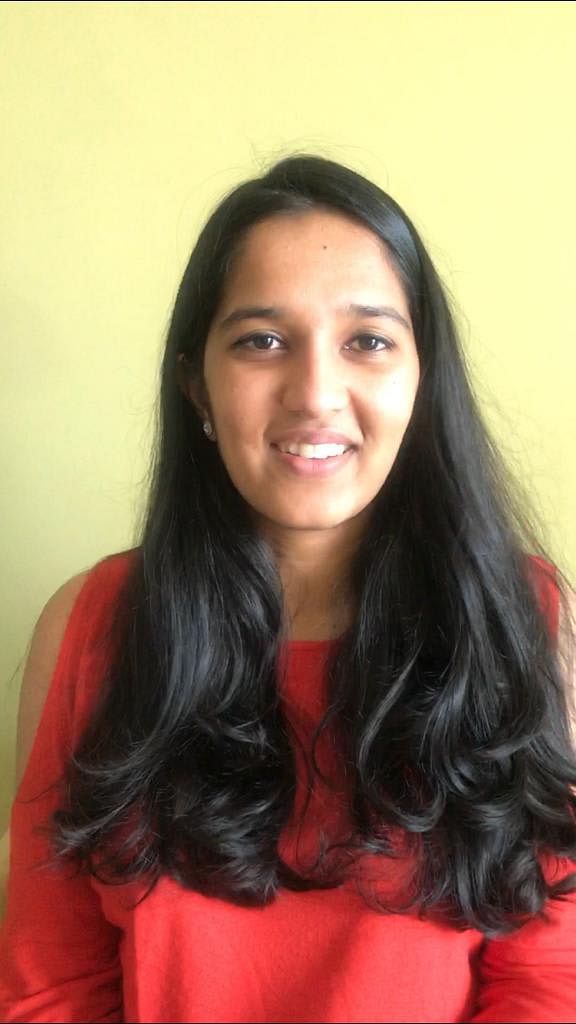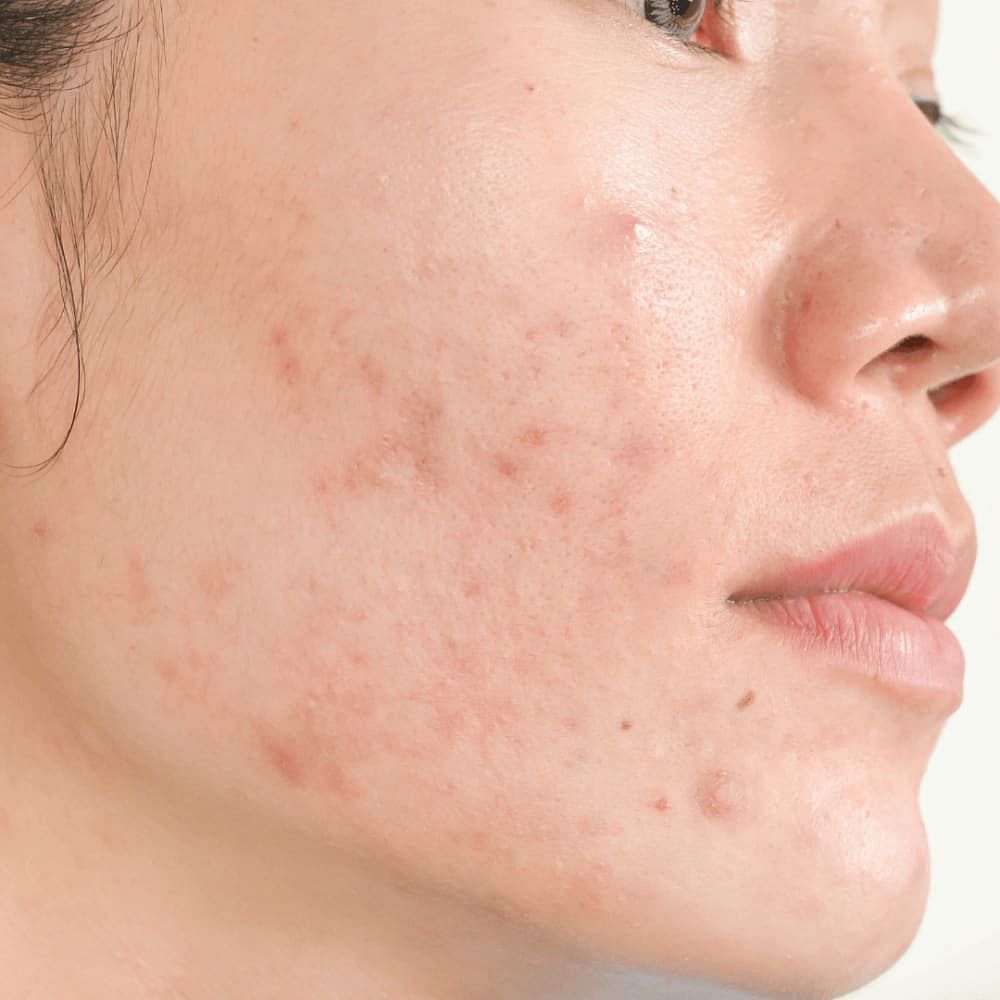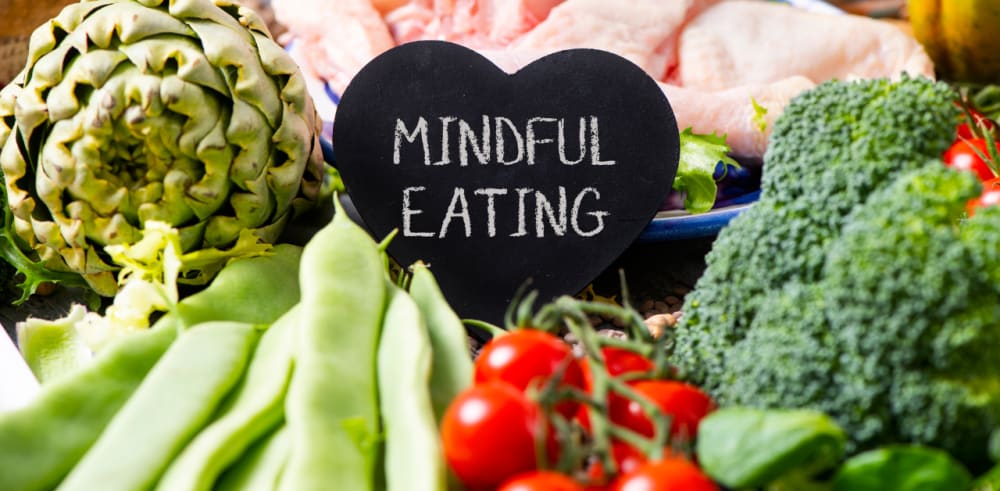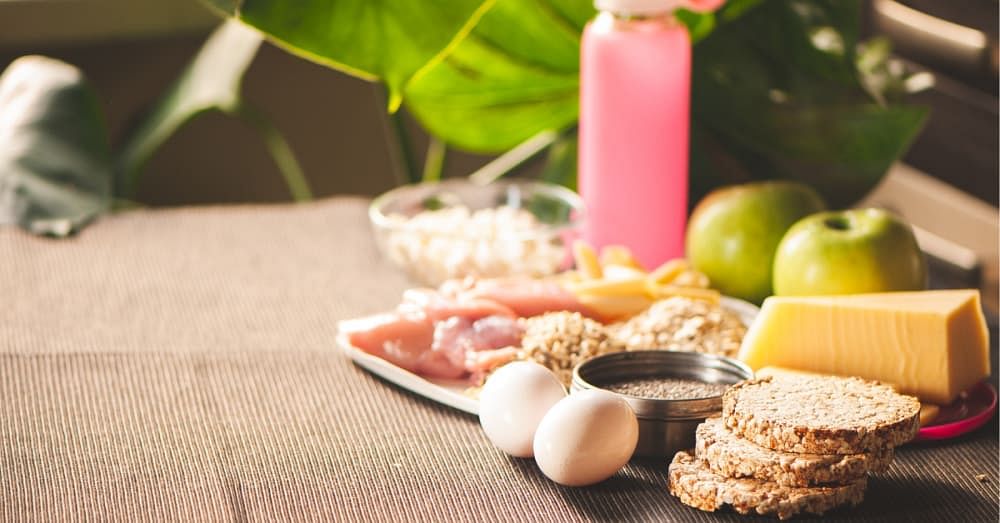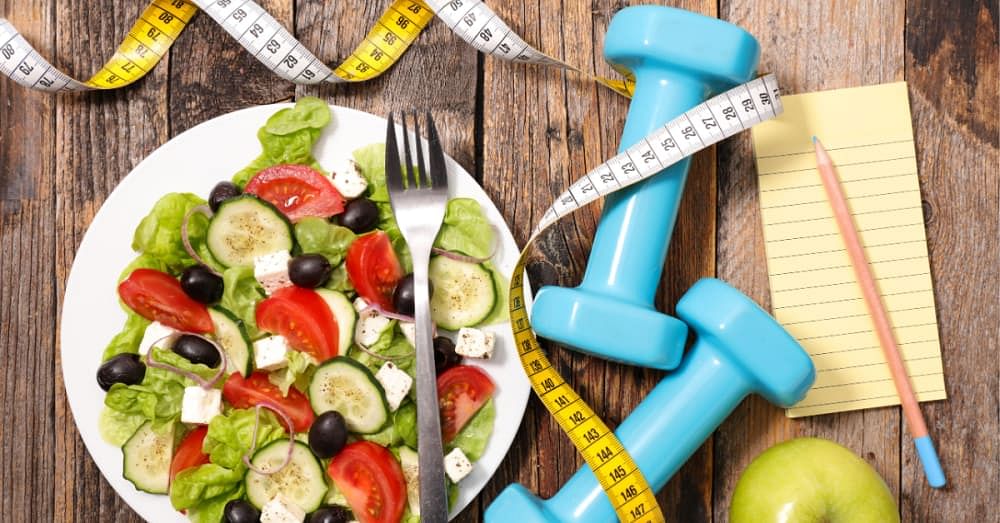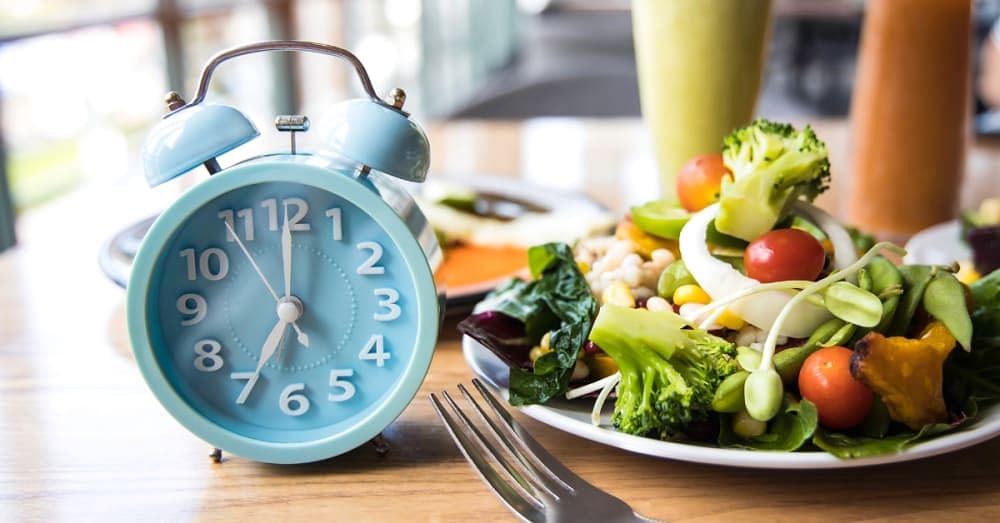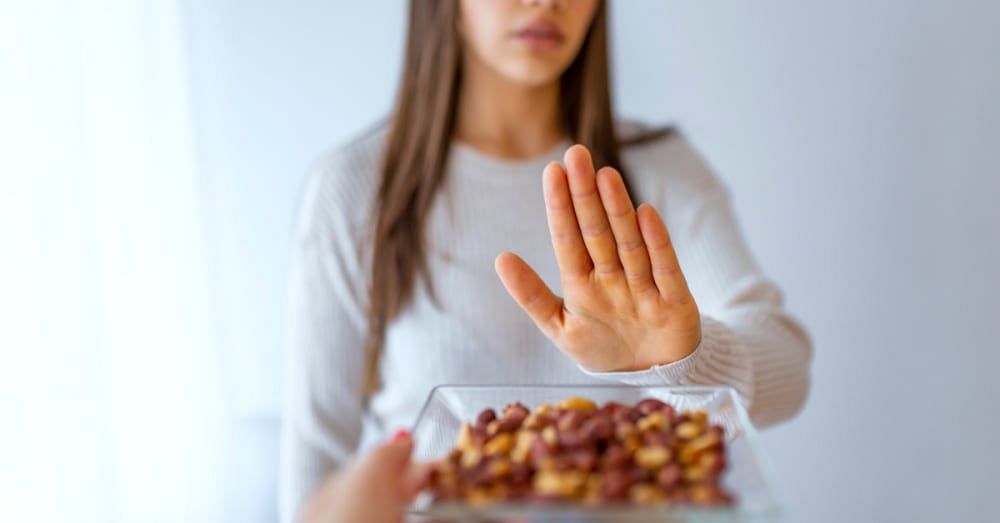According to some studies, PCOS - Polycystic Ovarian Syndrome is a lifestyle and hormonal disorder that affects the body's hormone balance. This causes ovary enlargement and the formation of small cysts on its outer edges.
Some other hormonal side effects of PCOS include fertility issues, ovulation prevention, PCOS pimples, excessive facial hair growth, hair loss, inflammation, obesity, increased insulin resistance, irregular period, and acne.

Is There a Connection Between PCOS and Acne?
Yes, there may be a connection between PCOS and acne. As per studies, PCOS and skin problems often go hand in hand because the skin is considered a window that reflects whatever happens inside our body. However, androgens play a key role in acne development, causing excess oily sebum production. This starts trapping bacterias within the skin, causing inflammation.
Due to this increased production of skin oil generating hormones such as androgens which are produced by ovaries, individuals undergo skin problems such as PCOS acne and pimples. It can cause acne in various areas of the skin, such as the neck region, face, chest, and even upper back.
Also, a visible difference in PCOS acne during pregnancy is observed due to sudden and drastic changes in hormones.
PCOS Acne Causes
Polycystic ovary syndrome is a hormonal disorder among women. It causes enlargement of ovaries or the occurrence of small cysts in the ovaries. Polycystic means the presence of multiple cysts. PCOS is essentially a hormonal imbalance that results in irregular periods, PCOS acne, weight gain, and more. Studies found that around 10-34% of women who have PCOS also suffer from PCOS acne.
PCOS occurs among women during reproductive age. Research suggests that around 26.7 percent of women in this age group have PCOS. The condition leads to an increase in the levels of male hormones like testosterone. A woman's body depends on female hormones like estrogen and progesterone for regular ovulation.
Studies found that PCOS disrupts the production of female hormones, causing a drop in these levels. Thus, increasing testosterone levels. This hormone causes the small glands present in the skin that secrete sebum to produce more oil.
Acne occurs when there is a build-up of oil and dead skin cells. This traps the bacterias beneath the skin. Subsequently, this clogs the pores, leads to inflammation and creates the right environment for breakouts.
Patients report a flare-up of PCOS pimples and acne near their menstrual cycle. Later on, they can take time to go away. One often asks women with persistent adult acne to get tested for PCOS.
Other Causes of Acne
Studies suggest acne is one of the most common skin problems which are caused due to blockage of skin pores or hair follicles. These acnes can be caused by many reasons other than acne due to PCOS. Some such causes are listed below:
- Excessive oil production
- Overgrowth of acne-causing bacteria
- Hormone imbalance
- Abnormal shedding and trapping of dead skin in the pores
- Side effects of certain medications
- Excessive stress and depression
- Also, bad habits such as not washing your face regularly and properly
- Not drinking enough water
- Using comedogenic skin products
PCOS Acne Location
One usually considers certain areas to be hormonally sensitive. Acne due to PCOS mostly erupts in the lower third of the face. This generally includes the jawline, upper neck, cheeks and chin. Some women might also develop acne in the chest and upper back region.
The mentioned areas are considered to be a hormonal pattern in women with PCOS. Usually, PCOS acne tends to be larger, more aggravated and slower to resolve. Often the acne erupts in a cluster of cysts and might also be painful.
Also read: Fight acne, pimples and blackheads with Clinminskin

PCOS Acne Treatment
PCOS acne is essentially a type of hormonal acne. The treatment for hormonal acne varies in women, depending on their skin type. Women with PCOS should talk to their physician before trying a new therapy.
1) Over-the-counter medication
Wondering how to get rid of PCOS acne? Well, the most common PCOS acne treatment is over-the-counter acne medications. These medications usually contain benzoyl peroxide, salicylic acid and sulphur. The chemical compounds penetrate your skin and dissolve the dead skin cells that clog your pores. It also decreases redness and inflammation of the skin.
Benzoyl peroxide also helps in killing the acne-causing bacteria trapped beneath the skin. However, certain chemical irritants in these medications may also cause dryness of the skin. These OTC medications help with mild breakouts. Therefore, one should follow a PCOS acne skincare routine after consulting a doctor.
But to treat hormonal acne, you will have to address the root cause behind your hormonal imbalance. One often prescribes women with PCOS medications to help them with hormonal imbalances.
2) Oral contraceptives
One uses birth control pills to reduce severe hormonal acne. These can be prescribed alone or given as an adjunct to the treatment of PCOS. These medications can regulate your hormonal balance and relieve symptoms like excessive hair growth.
Research found a 30-60% reduction in inflammatory acne with oral contraceptive therapy. Usually, combination pills that contain a mix of Ethinyl estradiol are prescribed. However, oral contraceptives should not be taken by every woman. It is essential to consult your doctor to find the safest combination for you.
3) PCOS acne diet
Apart from medications, studies have found that one can regulate PCOS with the proper diet. Many doctors advise women to avoid food products that cause inflammation. Research suggests that dairy products increase IGF - 1 (a hormone) levels, which causes an increase in testosterone, hence increasing acne.
Research found that a diet low in cholesterol and carbohydrates and high in fibres could improve metabolic features of PCOS.

4) Lifestyle changes and weight loss
Curious about how to get rid of PCOS acne? Other methods that doctors recommend are diet and lifestyle modification to women who have PCOS and a body mass index greater than 25. One frequently links PCOS with obesity and insulin resistance. Weight loss and increased insulin sensitivity can help in regulating the hormonal features of PCOS.
PCOS Acne Diet
Studies suggest that diet plays a crucial role in PCOS. Diet rich in foods with natural inflammatory properties can lead to an increased occurrence of PCOS acne. These include red meats, sugary and dairy products, white bread, and even white potatoes.
Whereas some of the anti-inflammatory foods include tomatoes, almonds, spinach, olive oil, kale, walnuts, berries, salmon, and even turmeric. However, Diet changes are not the only treatment plan for PCOS acne, but it plays a crucial part in positively impacting overall PCOS treatment.
Also, as per studies, you can even include a few supplements of vitamins and minerals in your diet to prevent PCOS acne, such as Vitamin A, Vitamin E, Bromelain - an enzyme from pineapple, Zinc, Copper, Vitamin C, and Vitamin D.
A healthy PCOS acne diet also includes:
- Foods with high fiber content such as kiwi, orange, and broccoli.
- Natural and unprocessed food items.
- Non-starchy vegetables, whole grains, beans, legumes, nuts, seeds, and fruits such as berries, apples, and plums.
- Foods rich in Omega 3 fatty acids such as flaxseeds, fish oil, and walnuts.
- Antioxidants such as red grapes, blueberries, leafy green vegetables, green tea, fish, seafood, and peanuts.
- Opt for milk alternatives or reduce the usual intake to view positive changes in your skin health.
Pro Tips on How to Managing PCOS Acne
As per studies, doctors often advise individuals with Polycystic Ovary Syndrome acne to take generic care of acne with PCOS acne home remedies to prevent even more skin breakouts and blockages. This will help in curing acne and not making the condition even worse. Some of the tips you should follow are:
- Wash your skin at least twice a day and even after excessive sweating.
- Avoid rough and abrasive scrubbing of your skin.
- Be gentle and extra careful with your skin.
- Do not touch, pick, or pop your acne, as it will make it even worse
- Shampoo regularly and rinse your skin with lukewarm water.
- Avoid excessive sun exposure as tanning can damage your skin.
- Also, consult the doctor when needed in case of any doubts.

Other PCOS Skin Problems
Another PCOS skin problem that women often face is the darkening of the skin. Brown skin discolouration called acanthosis nigricans develop on the neck, armpits or inner thighs. These discolourations are rough, dark and velvety patches of skin. Women with PCOS might also experience skin tags, dry skin and loss of hair.
Also read: Neem benefits for acne
Conclusion
Polycystic Ovary Syndrome still has no listed cure, but improving the lifestyle and taking a grip over hormone imbalance can lead somewhere positive. However, early diagnosis of this disorder makes it easier for you to relieve hormone-induced symptoms and reduce the future risk of severe complications.
Women with PCOS often try to learn from their and others’ experiences to answer the question of how I cured my PCOS acne or how can I cure PCOS acne within this time period to get maximum results. But, if you encounter any of the symptoms related to PCOS, then you must pay a visit to the doctor as soon as possible to get further assistance within an appropriate time. They will surely determine the root cause of your acne or other skin problems to serve the PCOS acne treatment in a better manner.
FAQs
What Foods Trigger PCOS Acne?
As per reports, PCOS is directly affected by the diet you take. PCOS often causes acne due to the overproduction of androgens through ovaries. These hormones stimulate oil production in the skin, causing spots, breakouts, and acne. This production is highly triggered by a few foods types listed below:
- Foods with saturated or hydrogenated fats such as cheese, fatty red meats, or sugary desserts.
- Processed or fried food items such as white bread, biscuits, cakes, or packed ready-made meals.
- Avoid dairy products and gluten as much as possible.
- Avoid foods with unhealthy fats as they increase estrogen production, making PCOS symptoms worse. These foods include junk food items such as pizzas, burgers, and many more.
What Vitamins Help With Hormonal Acne?
Disturbance in hormone levels causes acne on the skin. However, studies suggest that some Vitamins and mineral supplements mentioned below will help your skin fight acne and rebalance hormone levels by reducing the excessive sweat and oil produced in the body to lead to clearer and glowing skin.
- Vitamin A: It acts as an antioxidant that fights free radicals to promote the generation of new skin cells and prevent acne, cell damage, and premature skin ageing. It also reduces inflammation and protects against environmental damage.
- Vitamin D: It contains antibodies that help strengthen the immune system by preventing the harmful effects of bacteria causing acne on the skin and is even used to treat many skin conditions such as psoriasis or skin rashes.
- Vitamin E: It has anti-inflammatory and antioxidant properties, which promote rapid absorption of nutrients in the skin. This causes acne to cool down and locks necessary moisture in the skin to promote collagen production.
- Zinc: It helps reduce oil production within the skin to prevent acne, which is produced through bacterial growth and blocked pores.
- Tea Tree Oil and Fish Oil: Tea tree oil has anti-bacterial and anti-inflammatory properties, which help reduce germs that boost acne and breakouts production. On the other hand, fish oil is rich in omega - 3 fatty acids that help in reducing inflammation and curing acne.
How Do You Stop Hormonal Acne Naturally?
As per studies, there are some ways you can cure hormonal acne with natural input. Taking a nutrient-rich and non-inflammatory diet, quitting smoking, drinking enough water, taking enough sleep, and reducing stress by keeping your both mind and body healthy are a few ways to overcome this skin hormonal problem.
This healthy diet involves cutting off milk, gluten, excessive sugar and adding foods rich in essential vitamins like vitamin D, magnesium, zinc, and many more. Also, making some changes in the daily routine can bring positive changes in your skin, such as:
- Wash your face at least 3 times a day, once before going to sleep, to remove dirt and germs from it.
- Avoid using acne reduction products in excessive amounts as it might cause skin irritation and redness. Also, use only non-comedogenic products to reduce the risk of skin pore blockages.
- Wear appropriate and skin-friendly sunscreen before stepping out every day.
How Do I Know if My Acne Is Hormonal or Bacterial?
Studies suggest that acne can be caused by various reasons, from disturbance in hormone levels to severe flares of bacterial overgrowth. It is caused when the pores of the skin get blocked. However, hormonal acne is caused by increased hormone fluctuations, which boosts oil production in the skin.
The initiation of this hormonal acne is visible at unaware patches of the jawline and even chin. When this oil starts interacting with bacteria present on the skin pores and hair follicles, then the acne caused through this interaction is called bacterial acne.
References
Amy T Lee, Lee T Zane (2007) Dermatologic manifestations of polycystic ovary syndrome (National Library of Medicine) https://pubmed.ncbi.nlm.nih.gov/17645376/
V Dramusic, U Rajan (1997) Adolescent polycystic ovary syndrome (National Library of Medicine) https://pubmed.ncbi.nlm.nih.gov/9238269/
Wendy M. Wolf, Rachel A. Wattick (2018) Geographical Prevalence of Polycystic Ovary Syndrome as Determined by Region and Race/Ethnicity (U.S. National Library of Medicine) https://www.ncbi.nlm.nih.gov/pmc/articles/PMC6266413/
Christopher R. McCartney, John C. Marshall (2016) Polycystic Ovary Syndrome (U.S. National Library of Medicine) https://www.ncbi.nlm.nih.gov/pmc/articles/PMC5301909/
Shalini Gainder, Bharti Sharma (2019) Update on Management of Polycystic Ovarian Syndrome for Dermatologists (Indian Dermatology Online Journal) https://www.ncbi.nlm.nih.gov/pmc/articles/PMC6434760/
Crystal C. Douglas, Barbara A. Gower (2006) Role of diet in the treatment of polycystic ovary syndrome (U.S. National Library of Medicine) https://www.ncbi.nlm.nih.gov/pmc/articles/PMC3752890/
Rajani Katta, Samir P. Desai (2014) Diet and Dermatology (The Journal of Clinical and Aesthetic Dermatology) https://www.ncbi.nlm.nih.gov/pmc/articles/PMC4106357/
Melnik B.C. (2011) Evidence for Acne-Promoting Effects of Milk and Other Insulinotropic Dairy Products (Nestle Nutrition Institute Workshop, Pediatric Program) https://www.karger.com/Article/Abstract/325580

